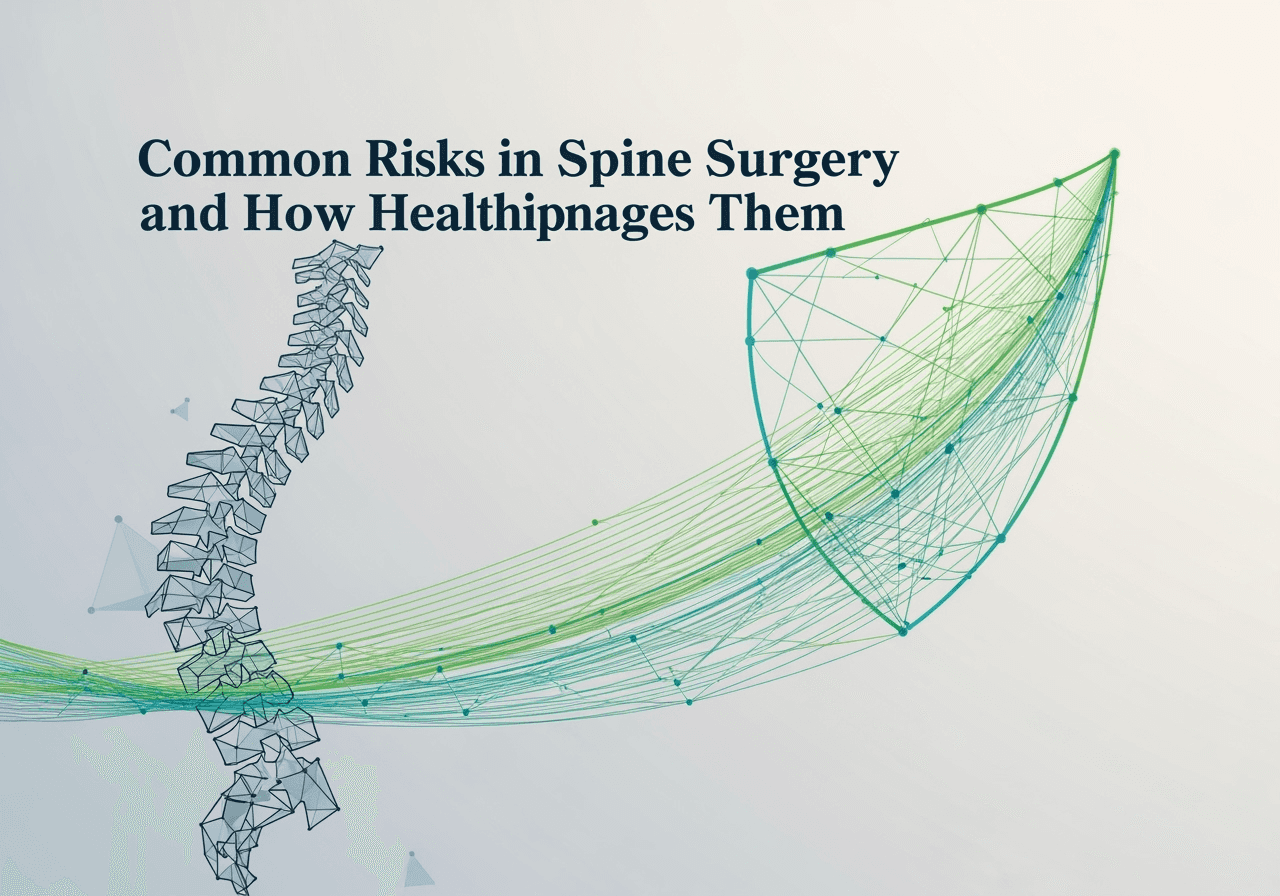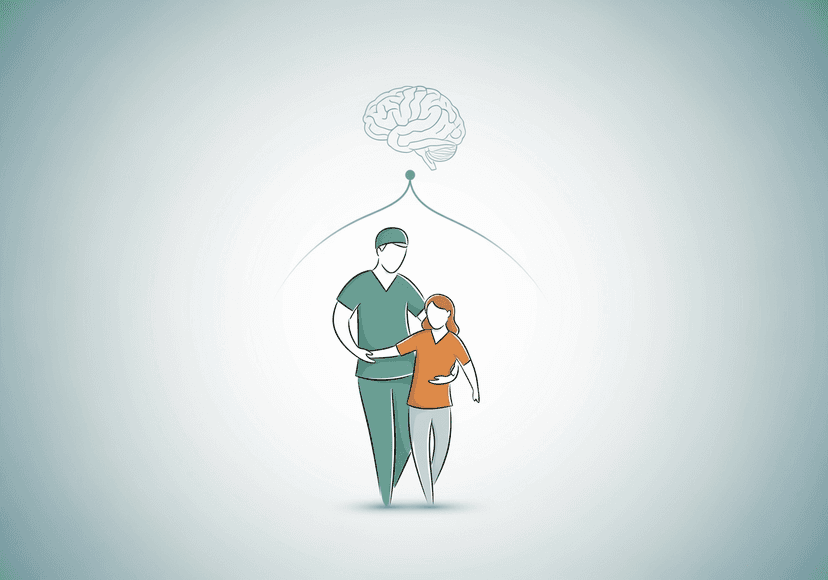
Common Risks in Spine Surgery and How Healthtrip Manages Them
14 Oct, 2025
 Healthtrip
Healthtrip- What are the Common Risks Associated with Spine Surgery?
- Understanding and Mitigating the Risk of Infection After Spine Surgery
- Nerve Damage: Causes, Symptoms, and Prevention Strategies in Spine Surgery
- Blood Clots After Spine Surgery: Identifying and Preventing Thrombotic Events
- Hardware Failure in Spinal Implants: Risks, Causes, and Solutions
- How Healthtrip Minimizes Risks in Spine Surgery: A Patient-Centric Approach
- Collaborating with world class hospitals like Fortis Memorial Research Institute, Gurgaon; Memorial Sisli Hospital, Istanbul; Helios Klinikum Erfurt, Germany; Vejthani Hospital, Bangkok and Quirónsalud PROTON THERAPY CENTRE, Madrid.
- Patient Preparation and Education: Empowering Patients to Reduce Surgical Risks
- Conclusion: Prioritizing Safety and Positive Outcomes in Spine Surgery with Healthtrip
Common Risks in Spine Surgery
Infection
Any surgical procedure carries the risk of infection, and spine surgery is no exception. Infections can occur at the incision site or deeper around the spinal cord and vertebrae. These infections can range from mild, requiring only antibiotics, to severe, potentially necessitating additional surgery to clean the infected area. Factors such as the length of the surgery, the patient's overall health, and pre-existing conditions can influence the likelihood of infection. Healthtrip prioritizes partnering with hospitals, such as Fortis Hospital, Noida and Fortis Memorial Research Institute, Gurgaon, that adhere to strict sterile protocols and have robust infection control measures in place. We also ensure patients receive comprehensive pre-operative assessments to identify and address potential risk factors. Post-operative care, including diligent wound care and monitoring for signs of infection, is crucial, and our team provides ongoing support and education to help patients stay vigilant and report any concerns promptly.
Most popular procedures in India
Nerve Damage
Given the proximity of the spinal cord and nerves to the surgical site, nerve damage is a significant concern in spine surgery. This damage can manifest in various ways, including pain, numbness, weakness, or even paralysis in the affected area. The risk of nerve damage depends on the complexity of the surgery, the specific location of the procedure, and the surgeon's expertise. While surgeons take meticulous precautions to protect the nerves during surgery, damage can sometimes occur despite their best efforts. Healthtrip collaborates with highly skilled surgeons at facilities like NMC Specialty Hospital, Al Nahda, Dubai and NMC Royal Hospital Sharjah, who utilize advanced techniques, such as intraoperative monitoring, to minimize the risk of nerve damage. We facilitate thorough pre-operative consultations to discuss the potential risks and benefits of the surgery, ensuring patients are fully informed. Furthermore, we provide access to comprehensive rehabilitation programs to help patients recover nerve function and manage any residual symptoms.
Hardware Complications
Many spine surgeries involve the use of hardware, such as screws, rods, and plates, to stabilize the spine and promote fusion. While these devices are designed to be durable and effective, complications can arise. These complications may include hardware loosening, breakage, or migration, which can cause pain, instability, and the need for additional surgery. Factors such as bone density, activity level, and the type of hardware used can influence the risk of these complications. Healthtrip partners with healthcare providers, such as those at Helios Klinikum Erfurt and Helios Emil von Behring, who are experienced in selecting the appropriate hardware for each patient and utilizing meticulous surgical techniques to ensure proper placement and stability. We also provide patients with detailed instructions on post-operative activity restrictions and lifestyle modifications to minimize the risk of hardware-related issues. Regular follow-up appointments and imaging studies are essential to monitor the hardware's integrity and address any problems promptly.
Wellness Treatments
Give yourself the time to relax
Lowest Prices Guaranteed!

Lowest Prices Guaranteed!
Blood Clots
Blood clots, also known as deep vein thrombosis (DVT), are a potential complication of any surgery, including spine surgery. These clots typically form in the legs and can travel to the lungs, causing a pulmonary embolism, a life-threatening condition. Prolonged immobility during and after surgery increases the risk of blood clots. Healthtrip works with hospitals like Vejthani Hospital and Yanhee International Hospital that implement preventative measures. These measures include the use of compression stockings, sequential compression devices, and, in some cases, blood-thinning medications. We encourage early ambulation and provide patients with exercises to promote circulation. Our team educates patients on the signs and symptoms of DVT and pulmonary embolism, emphasizing the importance of seeking immediate medical attention if any concerns arise. We also offer assistance with coordinating post-operative care, including home healthcare services, to ensure patients receive the necessary support to prevent and manage blood clots.
Failed Fusion
Spinal fusion is a procedure that aims to join two or more vertebrae together to eliminate motion and reduce pain. However, in some cases, the fusion may not heal properly, resulting in a "failed fusion" or pseudarthrosis. This can lead to persistent pain, instability, and the need for revision surgery. Factors such as smoking, poor nutrition, and underlying medical conditions can impair the fusion process. At Healthtrip, we understand the frustration and disappointment associated with failed fusion. That's why we connect our patients with leading spine specialists at facilities such as Quironsalud Hospital Murcia and Quironsalud Hospital Toledo, who have expertise in revision surgeries. These specialists utilize advanced techniques, such as bone grafting and biologics, to enhance the chances of successful fusion. We also provide comprehensive pre-operative counseling to identify and address risk factors that may compromise fusion. Furthermore, we offer ongoing support and guidance throughout the recovery process to help patients optimize their chances of a successful outcome.
How Healthtrip Manages Risks
Comprehensive Pre-operative Assessment
Healthtrip believes that a thorough pre-operative assessment is paramount in minimizing the risks associated with spine surgery. Our team of medical experts works closely with patients to gather a detailed medical history, perform a comprehensive physical examination, and order necessary diagnostic tests. This assessment helps identify potential risk factors, such as underlying medical conditions, allergies, and medication interactions, which may increase the likelihood of complications. We also evaluate the patient's overall health status, including their nutritional status, smoking habits, and psychological well-being, to ensure they are optimized for surgery. Healthtrip facilitates consultations with specialists, such as cardiologists and pulmonologists, as needed, to address any pre-existing medical issues. We provide patients with personalized recommendations and strategies to mitigate their individual risks, empowering them to make informed decisions about their care. By taking a proactive approach to pre-operative assessment, we strive to reduce the incidence of complications and improve patient outcomes, often using hospitals like LIV Hospital, Istanbul and Hisar Intercontinental Hospital for diagnosis.
Partnering with Experienced Surgeons and Facilities
The expertise and experience of the surgeon and the quality of the facility play a critical role in the success of spine surgery and the minimization of risks. Healthtrip partners with highly skilled and board-certified spine surgeons at reputable hospitals and clinics around the world, including Bangkok Hospital and Mount Elizabeth Hospital. Our surgeons have extensive experience in performing a wide range of spinal procedures, utilizing advanced techniques and technologies. They are committed to providing personalized care, tailoring their approach to each patient's unique needs and circumstances. Healthtrip carefully vets all our partner facilities to ensure they meet the highest standards of safety, quality, and patient care. These facilities have state-of-the-art equipment, advanced imaging capabilities, and robust infection control protocols. By collaborating with experienced surgeons and top-notch facilities, we aim to provide patients with the best possible surgical experience and minimize the risk of complications. Many of our facilities also offer comprehensive rehabilitation programs to support patients throughout their recovery.
Advanced Surgical Techniques and Technologies
Healthtrip is committed to providing patients with access to the latest advancements in surgical techniques and technologies. Minimally invasive surgical techniques, such as endoscopic spine surgery and percutaneous spinal fusion, can reduce the risk of complications, such as infection, blood loss, and muscle damage. These techniques involve smaller incisions, resulting in less pain, faster recovery, and improved cosmetic outcomes. Healthtrip also facilitates access to advanced technologies, such as intraoperative neuromonitoring, which helps protect the spinal cord and nerves during surgery. Computer-assisted navigation systems can improve the accuracy and precision of surgical procedures, reducing the risk of hardware malposition and nerve damage. Our partner hospitals, such as BNH Hospital and Singapore General Hospital, invest in cutting-edge technologies to enhance the safety and effectiveness of spine surgery. By embracing innovation and staying at the forefront of medical advancements, Healthtrip strives to provide patients with the most advanced and safest treatment options available.
Post-operative Care and Rehabilitation
Comprehensive post-operative care and rehabilitation are essential for a successful recovery after spine surgery. Healthtrip provides patients with detailed instructions on wound care, pain management, and activity restrictions. We encourage early ambulation and provide patients with exercises to promote circulation and prevent blood clots. Our team of physical therapists and occupational therapists develops personalized rehabilitation programs to help patients regain strength, flexibility, and function. We also provide patients with education on proper body mechanics, posture, and lifting techniques to prevent future back problems. Healthtrip offers ongoing support. Our team of case managers coordinates follow-up appointments, monitors the patient's progress, and addresses any concerns or questions they may have. By providing comprehensive post-operative care and rehabilitation, we aim to optimize the patient's recovery, minimize the risk of complications, and help them return to their normal activities as quickly and safely as possible. We work with facilities like Cleveland Clinic London, and The Royal Marsden Private Care, London to provide quality aftercare.
Ongoing Support and Education
Healthtrip understands that undergoing spine surgery can be a stressful and overwhelming experience. That's why we provide patients with ongoing support and education throughout their entire journey. Our team of patient coordinators is available to answer questions, address concerns, and provide emotional support. We offer a variety of educational resources, including brochures, videos, and online forums, to help patients better understand their condition, treatment options, and recovery process. Healthtrip also connects patients with support groups, where they can share their experiences and connect with others who have undergone similar procedures. We empower patients to take an active role in their care by providing them with the knowledge and resources they need to make informed decisions. By offering compassionate support and comprehensive education, Healthtrip strives to improve the patient experience and promote a positive outcome. We remain dedicated to our patients well beyond the surgical procedure, ensuring their long-term well-being and spinal health.
What are the Common Risks Associated with Spine Surgery?
Undergoing spine surgery can feel like navigating a complex maze, filled with both hope for relief and understandable apprehension about potential risks. It's essential to understand that while modern spine surgery has made remarkable advancements, no surgical procedure is entirely risk-free. Several factors influence the likelihood and severity of complications, including the patient's overall health, the complexity of the surgery, and the surgeon's experience. Common risks include infection, nerve damage, blood clots, hardware failure (if implants are used), and persistent pain. Each of these potential complications carries its own set of challenges and requires careful management. Healthtrip understands these concerns and collaborates with world-class hospitals like Memorial Sisli Hospital to ensure comprehensive pre-operative assessments and meticulous surgical techniques to minimize these risks. We believe in empowering patients with knowledge, so they can approach their surgery with confidence and realistic expectations. It's not just about the procedure itself, but also about the holistic care and support provided throughout the entire journey, making the experience as smooth and safe as possible.
Delving a bit deeper, let's consider the risk of infection, which, although relatively low, can still occur. Surgeons at Healthtrip's partner hospitals like Fortis Memorial Research Institute, Gurgaon, adhere to strict sterile protocols during surgery to minimize this risk. Nerve damage is another concern, as the spinal cord and nerves are delicate structures. Skilled surgeons employ advanced imaging and monitoring techniques to avoid causing injury during the procedure. Blood clots can form after any surgery, and preventative measures such as blood thinners and compression stockings are often implemented. Hardware failure, while not common, is a possibility if spinal implants are used. This is why the quality of the implants and the precision of their placement are crucial. Healthtrip ensures that its partner hospitals use state-of-the-art equipment and materials, and that the surgeons are highly experienced in using them. It's about creating a safety net, ensuring every possible precaution is taken, so you can focus on your recovery journey with peace of mind. Our priority is your well-being, and we're committed to providing the highest standards of care every step of the way.
Understanding and Mitigating the Risk of Infection After Spine Surgery
The risk of infection following spine surgery, while relatively low, remains a significant concern for patients and healthcare providers alike. Infections can occur at the surgical site, either superficially in the skin or deeper around the spinal structures. These infections can lead to prolonged hospital stays, additional treatments, and potentially compromise the surgical outcome. Various factors can increase the risk of infection, including the patient's overall health, the length of the surgery, and the presence of other underlying medical conditions such as diabetes or a weakened immune system. At Healthtrip, we recognize the importance of proactive measures to minimize infection risk. This starts with a thorough pre-operative assessment to identify and address any potential risk factors. For instance, patients with diabetes will have their blood sugar levels carefully managed before and after surgery. Smoking, which can impair wound healing and increase infection risk, is strongly discouraged. Our partner hospitals, such as Helios Klinikum Erfurt, Germany, employ strict sterile protocols throughout the surgical process, including meticulous skin preparation, the use of sterile instruments and drapes, and the implementation of laminar airflow systems in the operating rooms.
To further mitigate the risk of infection, prophylactic antibiotics are typically administered before surgery. The choice of antibiotic and the duration of treatment are carefully determined based on the specific type of surgery and the patient's individual risk profile. Post-operatively, patients are closely monitored for any signs of infection, such as fever, redness, swelling, or drainage at the surgical site. Early detection and prompt treatment are crucial to prevent the infection from spreading and causing more serious complications. Healthtrip also emphasizes the importance of patient education in preventing infections. Patients are instructed on proper wound care techniques, including keeping the incision clean and dry, and are advised to report any signs of infection to their healthcare team immediately. We provide comprehensive post-operative support, ensuring that patients have access to timely medical advice and assistance. By combining evidence-based practices with a patient-centered approach, Healthtrip strives to minimize the risk of infection and promote optimal healing and recovery for all our patients undergoing spine surgery at hospitals like Vejthani Hospital.
Nerve Damage: Causes, Symptoms, and Prevention Strategies in Spine Surgery
Nerve damage is arguably one of the most feared potential complications of spine surgery. The spinal cord and its surrounding nerves are delicate structures that control movement, sensation, and various bodily functions. While surgeons take every precaution to protect these nerves during surgery, there is always a risk of injury. Nerve damage can occur due to direct trauma from surgical instruments, compression from swelling or hematoma formation, or even stretching of the nerves during the procedure. The symptoms of nerve damage can vary widely depending on the location and severity of the injury. Some patients may experience pain, numbness, tingling, or weakness in their arms or legs. In more severe cases, nerve damage can lead to bowel or bladder dysfunction, or even paralysis. Healthtrip understands the anxiety surrounding this potential complication and places a strong emphasis on prevention and mitigation strategies. We partner with leading hospitals like QUIRONSALUD PROTON THERAPY CENTRE, Madrid, that utilize advanced surgical techniques and technologies to minimize the risk of nerve damage.
One of the most important tools for preventing nerve damage is intraoperative neuromonitoring. This technique involves using electrodes to monitor the function of the nerves during surgery, alerting the surgeon to any potential problems in real-time. If the neuromonitoring signals indicate that a nerve is being compromised, the surgeon can take immediate steps to correct the situation, such as repositioning instruments or adjusting the surgical approach. Healthtrip also ensures that its partner surgeons are highly experienced and skilled in performing complex spine surgeries. These surgeons undergo rigorous training and are experts in navigating the intricate anatomy of the spine. They use meticulous surgical techniques to minimize trauma to the nerves and surrounding tissues. Furthermore, Healthtrip emphasizes the importance of pre-operative planning and imaging. Detailed MRI or CT scans are used to visualize the spinal structures and identify any potential areas of concern. This allows the surgeon to carefully plan the surgical approach and avoid any unnecessary contact with the nerves. Post-operatively, patients are closely monitored for any signs of nerve damage. If nerve damage is suspected, prompt treatment with medications, physical therapy, or even additional surgery may be necessary to improve the chances of recovery. Our commitment at Healthtrip is to provide patients with the safest and most effective spine surgery possible, minimizing the risk of nerve damage and maximizing the potential for a successful outcome. At Saudi German Hospital Alexandria, Egypt, we find some of the best healthcare professionals in the world.
Also Read:
Blood Clots After Spine Surgery: Identifying and Preventing Thrombotic Events
Spine surgery, while often life-changing, can unfortunately increase the risk of blood clots, also known as venous thromboembolism (VTE). These clots can form in the deep veins of your legs (deep vein thrombosis or DVT) or travel to your lungs (pulmonary embolism or PE), posing serious health risks. The good news? Awareness and proactive prevention strategies can significantly reduce these risks. Several factors contribute to the increased risk of blood clots after spine surgery. Reduced mobility during recovery is a primary culprit. When you're less active, blood flow slows down, making it easier for clots to form. Additionally, the surgical procedure itself can trigger inflammation and activate your body's clotting system. Pre-existing conditions like obesity, a history of blood clots, certain genetic factors, and smoking can further elevate your risk. Recognizing the signs of DVT and PE is crucial. DVT symptoms in the leg include swelling, pain, redness, and warmth. If you experience sudden shortness of breath, chest pain, coughing up blood, or lightheadedness, seek immediate medical attention as these could indicate a pulmonary embolism. Early detection can lead to prompt treatment and prevent serious complications. At Healthtrip, we understand these concerns and prioritize patient safety. We work closely with our partner hospitals to implement comprehensive blood clot prevention protocols. These protocols often include the use of blood-thinning medications (anticoagulants), mechanical compression devices like sequential compression devices (SCDs) that inflate and deflate around your legs to promote blood flow, and early mobilization. Our care team also emphasizes patient education, ensuring you understand the importance of following prescribed medications, performing leg exercises, and staying hydrated. This empowers you to actively participate in your recovery and minimize your risk of blood clots. Remember, open communication with your medical team is key. Discuss your individual risk factors and any concerns you may have. Together, you can develop a personalized plan to ensure a safe and successful recovery journey.
Also Read:
Hardware Failure in Spinal Implants: Risks, Causes, and Solutions
Spinal implants, such as screws, rods, and plates, play a crucial role in stabilizing the spine after surgery, promoting fusion, and correcting deformities. While these devices are designed for durability, hardware failure, though relatively uncommon, is a potential complication. Understanding the risks, causes, and solutions can help you approach your spine surgery with realistic expectations and peace of mind. Several factors can contribute to hardware failure. Excessive stress on the implants due to activities that are strenuous, trauma, or non-union (failure of the bone to fuse properly) are common causes. The implants are designed to stabilize and assist in the fusion process, but the bone must eventually fuse around the implants for them to do their job. If fusion doesn't successfully take place, the hardware may fail because it's bearing a higher load than intended for a longer duration. Other possible causes of failure include implant loosening, infection, or even the patient’s bone quality. Certain conditions, such as osteoporosis, can weaken the bone and increase the risk of implant loosening. Signs of hardware failure can vary. You may experience increased pain, instability, or a return of pre-surgery symptoms. In some cases, hardware failure may be detected during routine follow-up X-rays, even if you aren't experiencing any noticeable symptoms. If you suspect hardware failure, it’s essential to consult your surgeon promptly for a thorough evaluation. The good news is that hardware failure is often treatable. Treatment options depend on the specific cause and severity of the failure. In some cases, conservative measures like bracing or pain management may be sufficient. However, revision surgery may be necessary to replace or repair the damaged hardware, address the underlying cause of the failure (such as non-union), and ensure proper spinal stability. At Healthtrip, we partner with hospitals and surgeons that use high-quality implants and employ meticulous surgical techniques to minimize the risk of hardware failure. Furthermore, our comprehensive post-operative care includes detailed instructions on activity restrictions, proper body mechanics, and strategies to promote bone healing. We also provide ongoing support and monitoring to detect and address any potential issues early on. We strive to make your spine surgery as successful and worry-free as possible.
Also Read:
How Healthtrip Minimizes Risks in Spine Surgery: A Patient-Centric Approach
At Healthtrip , we understand that undergoing spine surgery can be a daunting experience. That's why we prioritize patient safety and well-being every step of the way. Our commitment to minimizing risks starts long before the surgery itself and extends throughout your entire treatment journey. We believe in a patient-centric approach, tailoring our services to meet your individual needs and ensuring you feel supported, informed, and empowered. We carefully select our partner hospitals and surgeons, prioritizing those with proven track records of excellence, advanced technology, and a commitment to the highest standards of care. We collaborate with world-class institutions such as Fortis Memorial Research Institute, Gurgaon, Memorial Sisli Hospital, Vejthani Hospital and Quironsalud PROTON THERAPY CENTRE. These hospitals are known for their state-of-the-art facilities, experienced medical teams, and comprehensive spine surgery programs. Our rigorous selection process ensures that you receive the best possible care in a safe and comfortable environment. Healthtrip's commitment to safety also involves thorough pre-operative assessments. We coordinate comprehensive medical evaluations to identify any potential risk factors or pre-existing conditions that could affect your surgery or recovery. This includes a review of your medical history, physical examination, and any necessary diagnostic tests. Based on these assessments, we work with your medical team to develop a personalized treatment plan that addresses your specific needs and minimizes potential complications. We also believe that patient education is crucial for minimizing risks and promoting positive outcomes. We provide you with detailed information about your condition, the planned surgical procedure, potential risks and benefits, and post-operative care instructions. Our dedicated patient coordinators serve as your personal advocates, answering your questions, addressing your concerns, and providing ongoing support throughout your journey.
Patient Preparation and Education: Empowering Patients to Reduce Surgical Risks
Undergoing any surgery, especially one as significant as spine surgery, requires meticulous preparation and a thorough understanding of the process. Patient preparation and education are not merely procedural steps; they are powerful tools that empower you to actively participate in your care, minimize risks, and optimize your recovery. When you feel informed and prepared, you're better equipped to make confident decisions and navigate the challenges that may arise. Preparing for spine surgery involves both physical and mental readiness. Your healthcare team will provide specific instructions tailored to your individual needs and the surgical approach being used. These instructions may include guidelines on diet, exercise, medication management, and smoking cessation. Following these guidelines diligently can significantly reduce your risk of complications and improve your overall outcome. For example, quitting smoking several weeks before surgery can improve blood flow and reduce the risk of wound healing problems. Similarly, maintaining a healthy diet and engaging in light exercise can strengthen your body and prepare it for the demands of surgery and recovery. Education plays a vital role in ensuring your understanding of the entire surgical process. You should have a clear understanding of the reasons for your surgery, the specific goals of the procedure, the potential risks and benefits, and the expected recovery timeline. Don't hesitate to ask questions and voice any concerns you may have. Your healthcare team is there to provide you with the information and support you need to make informed decisions. Understanding the post-operative care plan is also essential. This includes knowing how to manage pain, care for your incision, recognize signs of infection, and gradually increase your activity level. You should also be aware of any restrictions on activities like lifting, bending, or twisting. Following these instructions carefully is crucial for preventing complications and ensuring proper healing. At Healthtrip, we understand the importance of patient preparation and education. We provide comprehensive resources and support to help you navigate every step of the process. Our patient coordinators are available to answer your questions, address your concerns, and connect you with the information you need to feel confident and prepared. We also work closely with our partner hospitals and surgeons to ensure that you receive personalized instructions and ongoing support.
Also Read:
Conclusion: Prioritizing Safety and Positive Outcomes in Spine Surgery with Healthtrip
Spine surgery is a significant decision, and prioritizing safety and positive outcomes is paramount. Throughout this discussion, we've explored potential risks associated with spine surgery, including blood clots, hardware failure, and the crucial role of patient preparation. It's essential to remember that while these risks exist, they can be significantly minimized through careful planning, advanced surgical techniques, and a patient-centered approach. At Healthtrip, we are committed to providing you with a safe and successful spine surgery experience. We meticulously select our partner hospitals, ensuring they adhere to the highest standards of care and employ the latest advancements in spine surgery. We believe in transparency, providing you with comprehensive information about your condition, treatment options, and potential risks and benefits, enabling you to make informed decisions. Our patient-centric approach means that we prioritize your individual needs and concerns. Our dedicated patient coordinators will be there to support you every step of the way, answering your questions, addressing your anxieties, and ensuring you feel comfortable and confident throughout your journey. We also emphasize the importance of patient preparation and education, empowering you to actively participate in your care and optimize your recovery. From pre-operative assessments to post-operative rehabilitation, we provide you with the resources and support you need to achieve the best possible outcome. Healthtrip works closely with hospitals like Vejthani Hospital and Memorial Sisli Hospital. Choosing Healthtrip means choosing a partner that is dedicated to your safety, well-being, and positive outcomes. We are committed to providing you with a world-class spine surgery experience that is both safe and effective, allowing you to regain your quality of life and live pain-free. < /p>
Related Blogs

End-to-End Logistics for Neuro Surgery with Healthtrip's Support
Detailed guide on neuro surgery, featuring doctors, hospitals, risks, recovery,

Healthtrip's Care Coordinators: Your Support During Neuro Surgery
Detailed guide on neuro surgery, featuring doctors, hospitals, risks, recovery,

Top 5 Indian Hospitals for Neuro Surgery
Detailed guide on neuro surgery, featuring doctors, hospitals, risks, recovery,

Post-Neuro Surgery Diet and Lifestyle Tips
Detailed guide on neuro surgery, featuring doctors, hospitals, risks, recovery,

Common Risks in Neuro Surgery and How Healthtrip Manages Them
Detailed guide on neuro surgery, featuring doctors, hospitals, risks, recovery,

Is Neuro Surgery Right for You? Healthtrip Explains Evaluation Steps
Detailed guide on neuro surgery, featuring doctors, hospitals, risks, recovery,










